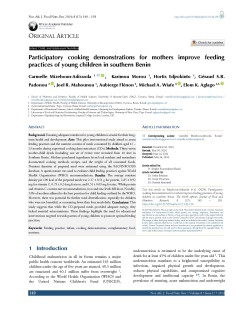Participatory cooking demonstrations for mothers improve feeding practices of young children in southern Benin
Abstract
Background: Ensuring adequate nutrition for young children is crucial for their long-term health and development.
Aim: This pilot interventional study aimed to assess feeding practices and the nutrient content of meals consumed by children aged 12 – 23 months during supervised cooking demonstrations (CDs).
Methods: Thirty-seven mother-child dyads (including one set of twins) were recruited from 10 sites in Southern Benin. Mothers purchased ingredients from local markets and researchers documented cooking methods, recipes, and the weight of all consumed foods. Nutrient densities of prepared meal were estimated using the FAO/INFOODS database. A questionnaire was used to evaluate child feeding practices against World Health Organization (WHO) recommendations.
Results: The average nutrient density per 100 kcal of the prepared meals was 2.17 ± 0.51 g for protein, 2.85 ± 0.92 mg for vitamin C, 0.79 ± 0.24 mg for iron, and 0.51 ± 0.09 mg for zinc. While protein and vitamin C content met recommendations, iron and zinc levels fell short. Notably, 53% of mothers adhered to the best practices for child feeding outlined by the WHO. However, there was potential for further meal diversification, especially for children who were not breastfed, or consuming fewer than four meals daily.
Conclusions: This study suggests that while the CD-prepared meals provided adequate energy, they lacked essential micronutrients. These findings highlight the need for educational interventions targeted towards parents of young children to promote optimal feeding practices.
Keywords: Feeding practice, infant, cooking demonstration, complementary food, nutrient.
Full text article
Authors
Copyright (c) 2024 Carmelle Mizéhoun Adissoda, Karimou Morou, Hortis Edjrokinto, Géraud S.R. Padonou, Joel R Mahounou, Aubierge Flenon, Michael A Wiafe, Elom K Aglago

This work is licensed under a Creative Commons Attribution 4.0 International License.
-
Attribution — You must give appropriate credit, provide a link to the license, and indicate if changes were made. You may do so in any reasonable manner, but not in any way that suggests the licensor endorses you or your use.
-
No additional restrictions — You may not apply legal terms or technological measures that legally restrict others from doing anything the license permits.





